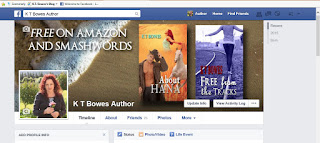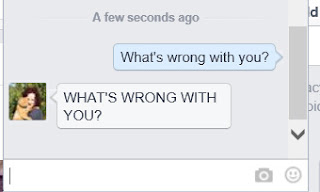Yeah, so I’m still harping on
about the Amazon review system, whereby they
retain the right to decide if I know or am known by an author. What’s knowing
someone? Is it an occasional private message on an author’s Facebook page or
meeting up for coffee?
I messaged the band, Heart of Katherine to ask if I could use
their track, My Salvation for the
trailer of my teen novel, A Trail of Lies.
They came back within a few hours and said yes, directing me to the site where
I could pay and download my legitimate copy. My husband paid on his credit card
and downloaded the song while I ran around the house like a maniac because
someone who can sing - and sings very well, I’ll have you know - was kind enough
to get back to me and have a conversation. Even if they’d said no, I’d have
been stoked with the reply because...well, they’re on the TV and everything and
they deigned to speak to me, a nobody in rural New Zealand, with a messy house
and kids and a cat. Does that mean I know them? Not really. But somehow my
private message to them leaves a trail, which Amazon follow and deem as a
relationship. I made my trailer and sent the band the link. It was crap; the
only good thing about it was the backing track, but they said it was good
because they’re obviously nice people. Now presumably I just made the trail
stronger. Is that how it’s working nowadays? I went to their website and listened to the track on YouTube. Did I make it worse for myself by doing that?
So the indie world is upset as
Amazon culls thousands upon thousands of reviews and the petition currently
going around the globe is garnering support from readers and authors alike. At
10k the petition organiser was going to send it on to Amazon but it just went
over 11k and is still moving like a bushfire.
I said in a previous blog that
this started three years ago and the sad fact is; it did.
I wanted to see how the petition
was going this morning so I Googled, ‘Change.org Amazon petition’ and guess
what I found? Another one, from 3 years ago, started by Derek Blass from
Denver, who got 628 supporters.
This is his petition: https://www.change.org/p/amazon-stop-arbitrarily-removing-customer-reviews-from-indie-author-books
This was his premise, an eerie
forerunner of the one currently circulating:
“Amazon
is currently removing customer reviews from books published by indie authors
without any notice, and without any explanation. This petition demands that
Amazon explain for every author that loses a review (good or bad) why that
review was removed, and set forth clear guidelines as to what will and will not
be removed in the future.”
Well,
poor Christoph Fischer can testify he still doesn’t know why his 1700
legitimate reviews of other people’s work were removed, or why he was banned
from reviewing on Amazon again. The only thing it can be, is that he was deemed
to ‘know’ all 1700 authors. He looks like a social, fun kinda guy but really?
One of the reviews they removed was for my novel and much as I’d like to, I’ve
never met him, had coffee with him or even private messaged with him. There's a whole lot of ocean between him and me, which presumably Amazon don't deem to be a significant obstacle.
I asked
Derek if I could quote from his blog. 3 years ago he published a series of
questions and answers from Amazon, which came about presumably as a result of
his petition and the signatures of the 628 people who supported him.
From
Derek Blass’ blog.
“Are authors and artists
allowed to review other authors/artists’ works?
Authors and artists can add a unique
perspective and we very much welcome their customer reviews. However, we don’t
allow anyone to write customer reviews as a form of promotion. If you have a
direct or indirect financial interest in a product, or perceived to have a close
personal relationship with its author or artist, we will likely remove
your review.”
So, it all hangs on that word,
PERCEIVED.
Back to Derek’s blog.
This is the link if you’d like to
go there. It makes interesting reading.
And this is what he said back in
2012.
“A couple quick updates,
thoughts, and possible points of clarification. First, Amazon hasn’t taken the Change.org petition
seriously
yet. Maybe I don’t blame them. What impact could 210 signing indie
authors have? That’s why we’re pushing for 1,000. And, if that doesn’t get
their attention, then we’ll get 2,000. We will push until they will dialogue
with us, which is all we have requested...”
Then Derek goes on to say:
“I am starting to get information that
Amazon is adding another dimension to pulling reviews. It is not set forth in
any of their guidelines, but it could be called associated review pulling.
What does association mean? Anyone in your family. Friends. People
you work with. Reviews from all of these types of people have been removed
and/or blocked according to various people. They are being told it is because
they have a “financial interest” in your book, but that’s obviously a load of
crap. That’s just the catchall phrase they’re using to justify their actions. So,
in the future, it may not be possible to have anyone you know write
you a review. Just awesome, huh? Let’s make it harder for indie authors...
“This all stinks of so many other situations
where if there was just transparency, there would be no speculation, rumor, and
angst. Amazon could easily step up and give some clarity/description on this
whole issue. In fact, that’s all most people are asking for...”
3 years ago!
3 years ago and Derek Blass
raised the alarm. He said the words 'in the future,' and that future is now. Very few people listened. To be fair, the Indie market was
only just in its infancy but I bet this man wishes he’d found a bookie willing
to take bets on how it would go. About now, he’d be buying a boat, an expensive
car and raising his eyebrows at the rest of us because he could already see
back then how it was going.
So here we are, half way through
2015 and what have we got?
I can build a fan base of people
who love my work, but they can’t review because they’re deemed to ‘know’ me by
Amazon, who sneak around electronically behind my back and decide who my
friends are for me.
I can be part of a fan base for
an author whose work I grab hot off the press because I love it, but I can’t
review because I’m deemed to ‘know’ them by Amazon.
Where will we be in another 3 years’
time?
Will we look back, shaking our
heads and wishing we did something sooner?
I know there’s a tendency to
shrug and assume Amazon won’t listen. It's how I feel too. It’s not like they did any more than come
to the party 3 years ago and walk out with a party bag, is it? They just got
more autocratic, hiding behind automated speech and a robotic smile. “Thank you
for reaching out to us today.” Then they reach back and snatch any of your
precious reviews they deem to be bolstered by a personal relationship with the reviewer.
The good news is I can write
a nasty little 1* review for anything I like and it gets to stay. I’ve never
met the author, I don’t follow their website, Facebook or life. I absolutely
don’t like the way they wear their hair or Americanise the English language. I
can 1* everything they wrote and that’s absolutely fine with Amazon. I got a 1*
for one of mine by someone who admitted in the review, they neither bought nor
read my work. They just didn’t like how it followed on from the free first book, even though it clearly
states in the blurb it will do that and is only 99c for that reason. Amazon
left the review up, so that’s ok then. Apparently.
It’s a sad, sad state of affairs
and one that others saw coming. I wish I could go back in time and sign Derek's petition and force Amazon to give clarity and look at their monitoring of reviews then. I wasn't publishing in 2012 but others were and they didn't sign.
The current petition is now over
11k but there are over 3 million novels on Amazon so the percentage of
interested people is still frighteningly small. My maths is rubbish but I don’t
think it’s even 4%.
Amazon didn’t listen back then,
so why would they now? It needs to go further, get bigger and make much more
noise.
I review on Barnes & Noble
nowadays. They just seem happy to hear my opinion and I’m cool with that. It’s
as though Amazon are taking the legs out from under us. Good marketing screams,
‘Build a brand and a solid base, link in with fans and interact.’ Then along
comes Amazon and deems all that hard work to be ‘personal relationship’ and
wipes out the reviews. It’s just like tidal erosion and I don’t see it ending
well for Indies, I really don’t.
Sign the petition or don’t sign
the petition. But don’t look back in 3 years’ time and wish you did.
#Amazon #reviews #bullying




